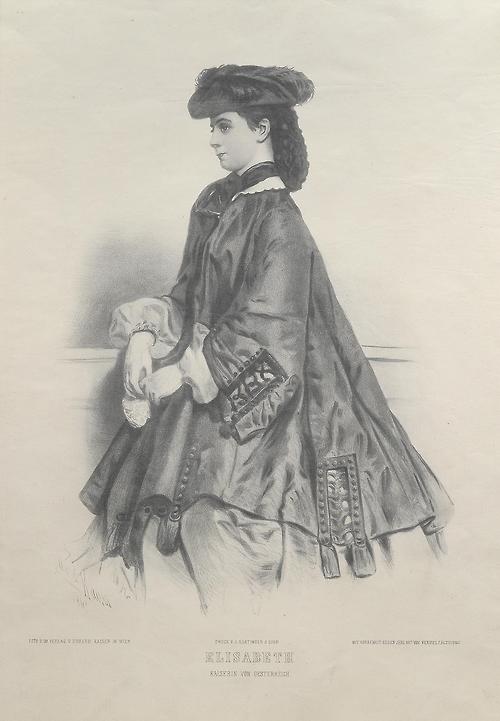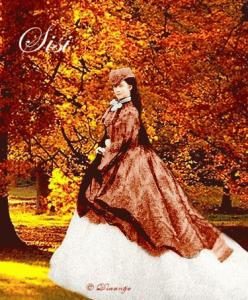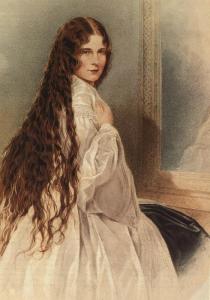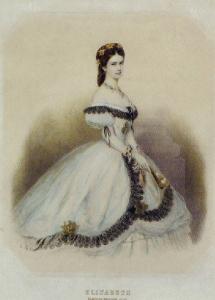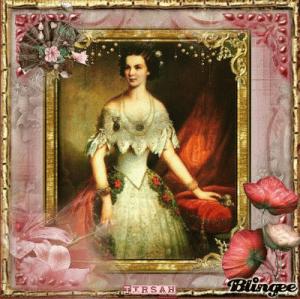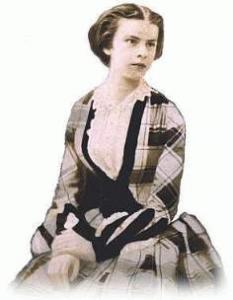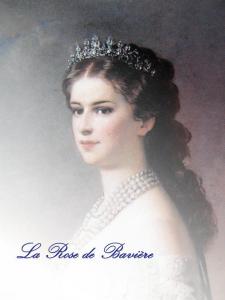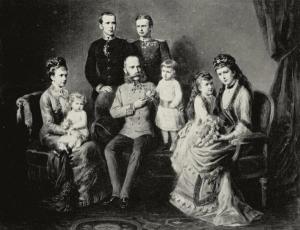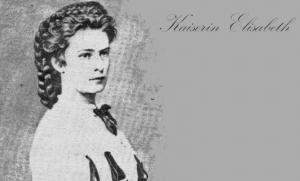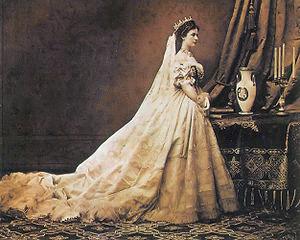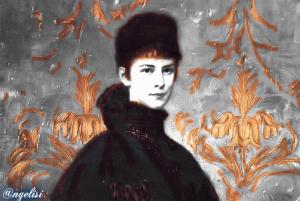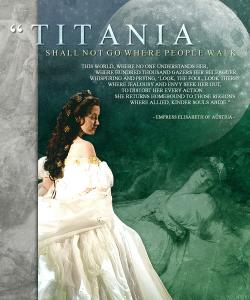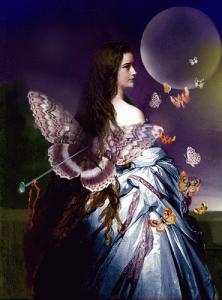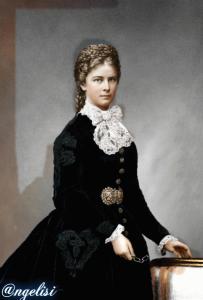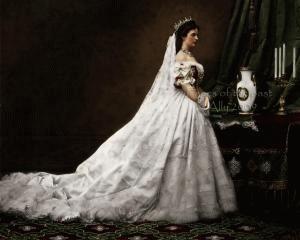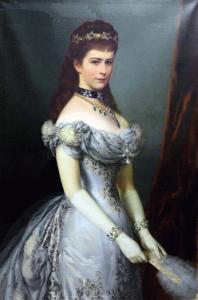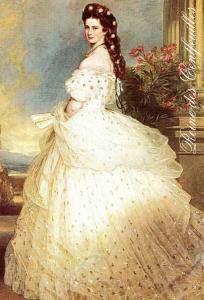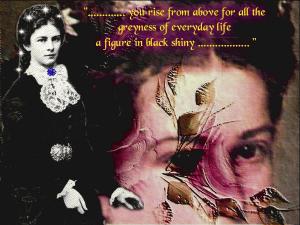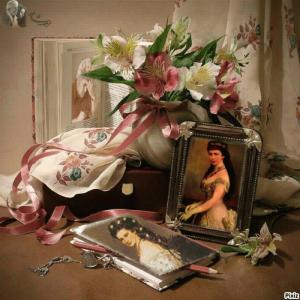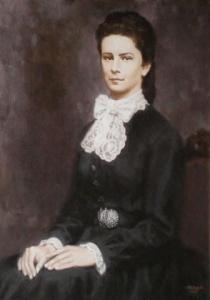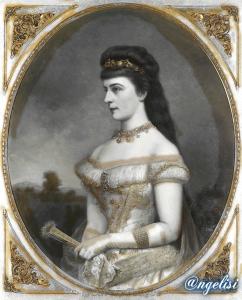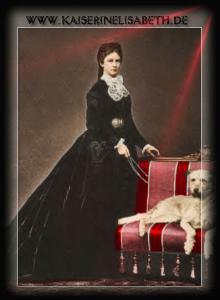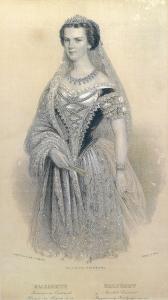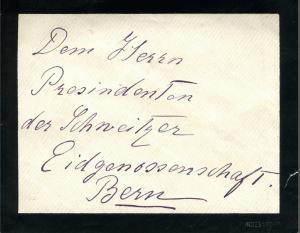
header by Sisi cassette poems 1890
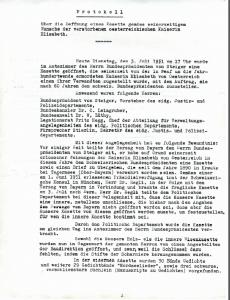
doc 1957 open box Sisi according to her wishes
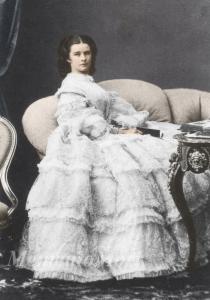
The poem of Sisi
Sissi began as a young girl to write romantic poems and sad. Girlfriend to an emperor, found nothing better than to invoke:
Oh swallow, give me your quick wings
And take me with you to distant countries.
I'll be happy to break the chains that hold me
And to break the bars of my prison ...
If I could fly with you
Through the blue eternity of heaven
How I would make thank you with all my being
The Goddess that men call freedom!
Bride to be ... and not proved to be more cheerful:
I had never left the road
That would take me to freedom:
I had never lost
Taking the path of vainglory.
I awakened in a prison
With arms entwined by painful chains.
I suffer more in the desire for you
You more freedom, abandon me ...
The girl ignorant soon turned into a woman is not trivial that, while not ceasing to complain of his fate, he appeared interested in the culture. He spoke English and French, and much cultivated by the Hungarian master it in a short time and it is a difficult language (a language of the Finno-Ugric group is not part of the Indo-European languages). In recent years, Elizabeth, mad for the Homeric poems and convinced of being able to communicate spiritually with the hero Achilles, he also studied the greek ancient and modern.
The passion of his life, however, was that the great poet Heinrich Heine. Heine died fifty-nine, when she was nineteen (1856), then they would also have to know: actually never met. But Elizabeth is often argued that the soul of the dead poet was in the night to join her and dictated the verses ... The study enthusiast Heine made the Empress a great expert of his work, to the point that the scholars turned for real expertise, and she could do no wrong: he could recognize the authenticity of a poem with absolute confidence.
The most fertile period of creativity Elizabeth went from 1884 to 1889. In 1884 he met another queen who, as a poet, it was very popular: her namesake Elizabeth of Romania, the German born Princess of Wied (1843 1916), whose nom de plume was the evocative Carmen Sylva. Though younger than she, the Queen of Romania seemed to her grandmother, as he was prematurely aged, and with the white hair, but the two women understood perfectly and became great friends. This, added to the cult of Heine, increased the interest of Sissi for poetic composition.
Comprising a respectable corpus of poems divided into two parts: "The songs of the North Sea" (Nordsee Lieder) and "Songs of Winter" (Winter Songs), the Empress would have liked to publish it but quickly realized he could not do: those poems were hot, as we would say today. However, not wanting to give up his dream of making them known, resorted to a trick. Copy from two of his relatives made the original of his poetic corpus and the only way he trusted to make print copies from a print shop: in fact he did not want anyone, perchance, recognize the handwriting of the Empress. This done, then gave several envelopes (do not know exactly how many) for his many loyal friends with an order to submit his work to the President of the Swiss Confederation in 1950.
It was 1889, bringing the tragic suicide of Rodolfo: since the Empress did not write a verse but not renounced his poetic ambitions:
Dear soul of the future! I entrust these writings. The great teacher who inspired them suggested I also what to do: may be published only when they are past sixty years from 1890 and the proceeds will be used to help victims of political persecution and their families in need. Even sixty years between the happiness and peace that is the freedom it will continue to not be at home on our small planet as well as not have been in my time. Maybe I will one day be in a different world. Today I am not able to say it, but maybe when you read these lines ... Have a nice day. I feel you near.
Titania
nel'estate written in 1890 while the train whistles and running fast
(Preface to "Diary poetic")
Titania was the queen of the fairies, with whom he had always identified. This dedication, prayer, or if you prefer, was inserted in envelopes with the hope that at least some of them could overcome the barrier of sixty-mail the author: and it was so.
The time passed. All the people closest to Elizabeth died: Franz Joseph (1916), Maria Valeria (1924), Gisela (1932), the daughter Stefania (1945). The Austro-Hungarian Empire collapsed in 1918, creating a small independent Hungary and Austria. Elizabeth tragic events which have never, even in his bitter disillusionment, could have predicted, shocked the world. Some of those parcels were lost but two survived: the one given to his brother Charles Theodore, which he passed on to a son, and that in the hands of the princes of Liechtenstein. So it was that in 1953 the Swiss president Philip Etter was in the hands of the poetic legacy of Elizabeth. He was not very flattered, in fact it was rather embarrassed. It was only in 1981, after a lengthy exchange of views between Switzerland and Austria, the Austrian Academy of Sciences published the work in full. To respect the wishes of the author, it was decided that any proceeds would be donated to the Relief Fund for Refugees politicians.
Why Sissi resorted to a ruse so complicated? Easy to understand: while eccentric and contemptuous of the conventions as it was, was fully aware that this publication would create, in his time, a scandal too serious. The Empress mocked it in his poems the court of Vienna with a ferocious sarcasm, dileggiandone members, along with those of the aristocracy: tease even the royal families of other countries, arriving for example to describe how he had teased and then disappointed in the future Edward VII of England, known womanizer who made her a pass: and so on. Not even Franz Joseph was saved entirely by its ironic contempt.
But there was a more important reason that discouraged an immediate publication. From a reading of his poems of the Empress a strongly Catholic country and militarist appeared to Republican ideas (called the monarchy "the expensive ornament that rests on the shoulders of his country"), only religious in his own way (he believed in a ruthless "Great Jehovah ") and more anticlerical, also declared himself also convinced pacifist.
From the literary point of view, the songbook of Sissi has a great value. The Empress is a disciple of Heine said, but remained an amateur unrealistic. The great poet wrote some of the most delicate and dreamy verses in German literature: The romance of Sissi was always a way. Heine also faced the most challenging and most of all the themes of his era, including policy, with a strong vein of irony and satire: Elizabeth could only be harshly sarcastic. Some wise work, which now follows, realizes this judgment. Some poems of Sissi are only descriptive and romantic moods inspired by nature, made, therefore, to the wild woods and the pale rays of the moon. The Empress is always compared to the seagull, the symbol of freedom:
I am a seagull Nessundove
No lido consider my homeland
No place, no place to itself binds me: ...
Today infinity with wings surf of the North Sea
The waves lull me and make me dream ...
Now ... I see the ruins of the castle
Wrapped in a light veil of silver
Woven from sumptuous rays that the moon of May
Through the doors of the hall spreads ...
From Songs of the North Sea (# 7)
But let's see how the author expressed his satirical and sarcastic. The metaphor that follows, for example, is very cruel. The Empress, on holiday in Bad Ischl with Francis Joseph, turns so a visit to the daughter Stefania:
At the foot of a majestic fir
On the soft moss rejoices
To be alone in the woods
A fragrant autumn cyclamen.
But it does not last long his joy:
That's out of the grass of the lawn
He comes out a big yellow toad and
That ends up at him.
Although there has been only briefly
Crushed to fine the map:
Poor flower! Almost mangled
He's now all bent ...
From Songs of the North Sea (Visit)
Although the tragedy of Mayerling was to come, with its train of heavy responsibilities assigned to Stefania, Princess of Belgium, who had married Rudolph, Elizabeth hated the already-in-law: he found a lanky ugly and pretentious, in a word, unbearable . Stephanie, (also known as "camel") returns as the target of Sissi in other compositions, but it is not the only one. Virtually all of the Viennese relatives fall under the lash of the Empress, and not only them. Here is the description of the Russian imperial family, met in Kremsier (today Kromeriz, Czech Republic) in August 1885 was this one of the few occasions in which Elizabeth had deigned to attend a state visit.
... A baboon, the sovereign, majestic towers
In foreign dress, austere and serious
The little monkey at his side, his wife
Frills ago reverence to the people howling.
The children, two monkeys very successful as the father
They occur even in military uniform.
A whole army of monkeys decorated
Is being done to grin and cackle ...
Some jackass diplomat finally complete the gang ...
From Songs of the North Sea (Kremsier)
Suffice it to say that the baboon is Tsar Alexander III (1845-1894), the little monkey Empress Maria (1847-1928), the monkeys very successful in the future Tsar Nicholas II (1868-1918) and his brother George (1871 - 1899). The distorting lens of hatred felt by Sissi caricatures that which was actually a family of very pleasing aspect: the tsar was a handsome and athletic man, the Tsarina, from the Danish royal family, a petite woman and extremely chic, the sons of two teenagers beautiful presence.
On a more personal level, Elizabeth completes his long poem dedicated to a series of men who admired and desired: they form a collection of donkey skins full of heads and hung it on a wall. The author likes to pass in review, and concludes:
The last one is hanging a little further:
The latter fact, however small and minute
For me it was the most awful cross.
He was a thoroughbred colt:
Very stubborn and headstrong
And even if it was from the ways many purposes
He was not to be trusted.
From Songs of the North Sea (Beautiful Art)
It is, of course, her husband Emperor. The perfidy of Elizabeth is refined: reproaches to her husband, as well as defects of character, even being a small man of modest stature. In fact, Francis Joseph, who also was considered a handsome man, not excelled in height. The photographers of the court came to retouch photos of the two imperial couple together because you could see that she was as tall as him. The emperor, under the name of Oberon, king of the fairies Titania mate, back again in these short verses in which the author reveals, in a very elegant (not for nothing that the metaphor of thistles and chestnuts is taken from Heine ), his anger for the bond that her husband has made with the actress Katharina Schratt (1853-1940), whom she considered a slut fat and vulgar. At the same time, however, Elizabeth realizes that such a report is necessary for the husband to get out of a solitude in which she herself, with her shortcomings as a wife, he confined:
What combines Oberon Titania does not matter.
Its principle is: let's not uncomfortable.
If thistles and chestnut one is content
She herself volerglieli serve.
From Songs of Winter
From site : http://www.letteraturadimenticata.it/Sissi.htm
letters and written from Sisi
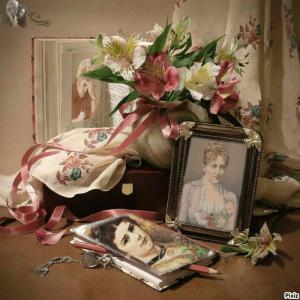
"The marriage of Rodolfo is unsuccessful is catastrophic. His wife welcomes the appointments of representation. A seventeen years he attended only the aristocracy more obtuse. Her philosophy is the representation of rank, his morals label"
letter from Elisabeth
From "Mirrors at oblique angles" of Matthew Tuveri Editions Arcane (quote from the book of Nicole Avril)
If I may allow a personal opinion of course his beloved Empress in terms of their consistency zero .............
Denigrates the daughter in law because she likes the Court and then uses it well to escape her the duties of a Empress, Congratulations!
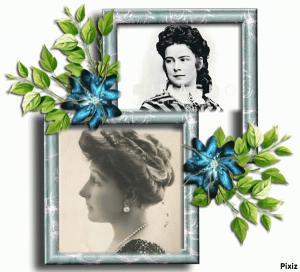
The visit
"Under a big fir
smelled sulteneromuschio
rejoicing a cyclamen
its green solitude.
But his joy did not last long
Why a frog very ugly yellow and thick
sprouting tufts of grass
fell between the head and neck
While stopping them for a short
Crushed him, poor thing!
Almost destroyed,
The cream he was reclined!
It 'happened to me
what happened to the plan:
I had to endure a visit
that threw me into despair
as the poor cyclamen
my soul is bowed;
and, like the toad very ugly a woman
me removed all traces of joy "
August 12, 1885 during the visit of the Prince to the Hereditary Imperial Couple
From "Mirrors at oblique angles" of Matthew Tuveri Editions Arcane
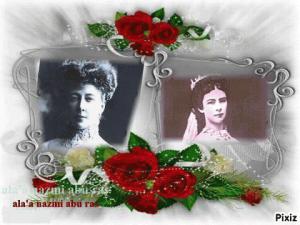
"Look at this camel bursting
pride from every pore
Enjoys the noise of the crowd
the cheers were for her a joy
And a delight PerLei attend the fair in the city,
A seuqela of ceremonies;
The drum leftovers!
Attention, here it is! Boom, Boom!
From "Mirrors at oblique angles" of Matthew Tuveri Editions Arcane
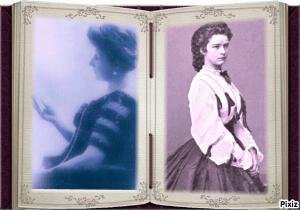
A. .......... "
You're not like a flower,
not at all sweet, graceful and delicate,
you miss each color
and even charming you were private
And when I hear you speak the sadness in my heart blossoms;
in youth without feeling in old age you rock It '
a pressing need for me
raise your hands to God and beg to unleash all his kindness,
and ch andthe little as possible you may encounter "
Elisabeth 1886 Bad Ischl during the visit of the Prince Hereditary From "Mirrors at oblique angles" of Matthew Tuveri Editions Arcane
DREAM A MIDSUMMER NIGHT'S(The comedy of Shakespeare that he loved so much Sisi)
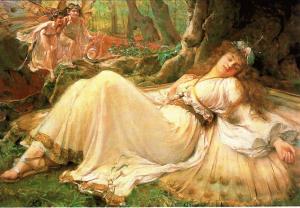
DREAM A MIDSUMMER NIGHT'S
(The comedy of Shakespeare that he loved so much Sisi)
The play has three interwoven stories, linked together by the celebration of the marriage of Theseus, Duke of Athens, and Hippolyta, queen of the Amazons. Two young Athenians, Lysander and Demetrius are both in love with the same woman, Hermia, Lysander loves it while her friend Elena is in love with Demetrius. But the father of Hermia Aegean requires the daughter to marry Demetrius. Then she runs away with Lysander into the woods, followed by Helena and Demetrius, but are lost in the dark and in their dalliances. Meanwhile, Oberon, king of the elves, and his wife Titania queen of the fairies come in the same forest to participate in the upcoming wedding. Oberon wants to use the Indian servant of Titania to make his page, but Titania and he does not want to squeeze the juice of the flower on the eyes vermilion Cupid, who falls in love with the first person you meet when you wake up and then get relinquish Indian servant which she, accordingly, will not be affected. At the same time, a band of artisans, to celebrate the marriage, wants to stage a popular representation on the theme of Pyramus and Thisbe, meets in the forest for rehearsals. Among them stands out Nick Bottom the Weaver, one of the most popular comic characters of Shakespeare. Oberon engages Puck, also called Hobgoblin or Robin Goodfellow, in order to help him in his goal. Also, after seeing Demetrius and Helena lost in the woods, orders Puck to squeeze the magic juice on the eyes of Demetrius to make it fall in love with Elena, but by mistake Puck squeezes the juice on the eyes of Lysander that the awakening Elena sees and falls in love madly, much to the chagrin of Hermia. But Puck has the time to play a joke on Bottom, who discovers that his head has been transformed into that of a donkey. Bottom will be just the first person that you fall in love with Titania, upon awakening, because of the pansy. At this point meets Titania Oberon, which fulfilled its purpose, agrees to dissolve the spell. Puck then rearranges things, including the head of the poor Bottom. Oberon also realizing the error of Puck puts the juice on the eyes of Demetrius. So now that Demetrius and Lysander run after Elena accapigliandosi between them. At the end Oberon orders Puck to rearrange everything in between lovers. Puck then sends down a mist fairy of the forest that the four boys are asleep. Then use the pink of thought so that Lysander loves Hermia again. So now everything is in place: Oberon and Titania are reconciled, and the four young people are two couples. These are found asleep at the edge of the woods the next day by Theseus, who hastened to prepare for the wedding. The news of the upcoming three marriages in turmoil sends the village, including workers Athenians who were trying to play in the woods, but these are not the main character of their comedy Pyramus, which was to be played by Bottom that they had abandoned in the woods with an ass's head: the morale is down. Fortunately, the protagonist enters the scene just in this moment of distress return from the woods, and urges his companions to prepare for the show. At the palace, Theseus, despite warnings from the master of ceremonies, choose their own show (Pyramus and Thisbe), maintaining that offered something with such good will can not be denied. At this point in the show part of the show: the artisans depict a clumsy version of the tragedy, making it funny ("I hear my Thisbe's face ..." "I see the sound of your voice .."), in which also includes a character in the role of the lion, one in the moonlight and another in the side of a wall. (!) The legendary performance of the craftsman Francis Flute, who plays (in a totally singular) the role of the lady Thisbe. The work ends with Puck walks in and says that if the show is not pleased the public, it can pretend he had slept, and can therefore be considered the show as a product of dreams, and that if they let you do that, Puck will make amends. Origin is not known with certainty when the play was written and staged for the first time, but it is expected between 1594 and 1596. Some have suggested that it may have been written in February 1596 for a performance on the occasion of the marriage of Sir Thomas Berkeley and Elizabeth Carey. It is not certain what kind has inspired the plot, although some ideas can be traced in classical literature, for example, the story of Pyramus and Thisbe is told in Ovid's Metamorphoses, while the transformation of Bottom into an ass is taken from the ass Golden Ass of Apuleius - two literary works that Shakespeare may have studied in school. In addition, more or less in the same period in which this play was written, Shakespeare was writing Romeo and Juliet, and can be detected in the plot whose protagonists Pyramus and Thisbe a comic reworking of the tragedy.
FROM THE SITE: http://it.wikipedia.org/wiki/Sogno_di_una_notte_di_mezza_estate_ (Shakespeare)
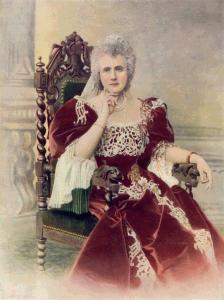
CARMEN SYLVA: Queen poet friend of the Sisi..
ELIZABETH OF WIED
(full name in German: Pauline Elisabeth Ottilie Luise zu Wied) (Neuwied, 29 December 1843 - Bucharest, 2 March 1916) was Princess of Wied and queen of Romania, was the daughter of Prince Hermann of Wied and German Mary of Nassau-Weilburg. Between 1857 and 1860 was as guardian Georg Sauerwein, famous poet and linguist Marriage married in 1869 Charles I of Romania. During the war turkish-Russian strove for the wounded. To this end, he founded the Order of Elizabeth, an honor which was awarded with the people that were distinguished in patient care. Favored also the higher education of women and formed numerous charitable society. Death, without children, the throne passed to his brother Charles Leopold of Hohenzollern-Sigmaringen, who gave it up in favor of his son William. William, in turn, gave it to his brother Ferdinand I of Romania. Poet Elizabeth, known by the name of Carmen Sylva was a Romanian poet and poetry translated into German. It was also a novelist and described Romania and the customs of the country. Among the admirers of Elizabeth was the Empress of Austria Elisabeth of Bavaria, who also went to visit her in Romania. The two sovereign also became friends and confidants. In 1888 he received the award Botta, conferred by the Académie Française, for the collection of aphorisms Les Pensees d'une reine (Paris, 1882). She wrote easily in English, French and German.
Other publications were:
■ the novel Aus zwei Welten (Leipzig, 1884);
■ the tragedy of Anne Boleyn (Bonn, 1886);
■ the short story collection In der Irre (Bonn, 1888);
■ the novel Edleen Vaughan, or Paths of Peril (London, 1894);
■ collection of poems Sweet Hours
■ (London, 1904), written in English Lineage The couple had only one daughter:
■ Mary (1870-1874), who died a child. Honours Class of the Order of the Queen of Luisa Queen of The Class of the Royal Order of Victoria and Albert
From the site: http://it.wikipedia.org/wiki/Elisabetta_di_Wied
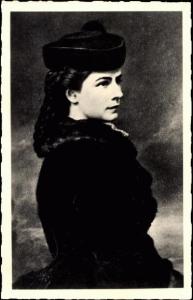
Poem of Sisi
Poetry by Elisabeth in to the moment leave with Bavaria for departure to Vienna "Farewell, farewell, bare trees evoi, large and small bushes. When there rivestirete of sprouts I am far from this castle "( Poetry by Elisabeth in to the moment leave with Bavaria for departure to Vienna )
"Prisoner, imprisoned in vain I yearn for the blue sky Iron bars, cold, hard wretches despise my bitter nostalgia "( Verse of of a poem by Elizabeth soon after married )
" I was tonight emperor, But of course, only in a dream, Wise to do so, How those are few." (Sisi Winter Songs, My Dream 1853)
"You have embittered my existence, You have soured my life, And finally shaken the faith In all that well on the world."
Elisabeth
"Dip me in the heart of the spear Release me from this world that without you, bleak and empty in vain holding me over " (Ischl, summer 1885)

"The poets sing of love, And breathes love nature, Oh! if they ever would! Of course! it would break no oath"
"And you beat on these leaves Then you meet Emit The blue waves of white foam, How salty fresh rain. "
"I chose to say goodbyethe quiet of a moonlit night -before me - or beautiful vision -You silvery shine forth.When tomorrow over the dunesyou will be touched by the rays of the sunI with fast wing beatI'll be far away already.Still hover over youflocks of white gulls;but one will, you'll see?and again:Oh sea, I sing a lot of songsWhat are your waves.The would write for you,I'd giftOf all my feelings, all my thoughts,And I diping my being lost.I would be the gem of your chest clear,O joy of my eyes, or the joy of my life,In the morning, you're my first hopeAnd at dusk is to you that I addressMy last look....................ElisabethI chose to say goodbye the quiet of a moonlit night - before me - or beautiful vision - You silvery shine forth. When tomorrow over the dunes you will be touched by the rays of the sun I with fast wing beat I'll be far away already. Still hover over you flocks of white gulls; but one will, you'll see? and again: Oh sea, I sing a lot of songs What are your waves. The would write for you, I'd gift Of all my feelings, all my thoughts, And I diping my being lost. I would be the gem of your chest clear, O joy of my eyes, or the joy of my life, In the morning, you're my first hope And at dusk is to you that I address My last look. ................... Elisabeth
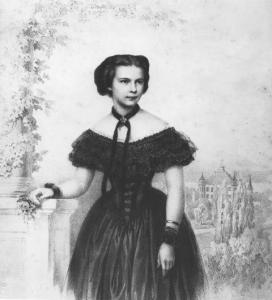
Poetry by Elisabeth to a moment leave with Bavaria for departure to Vienna
"Farewell, farewell, bare trees
evoi, large and small bushes.
When there rivestirete of sprouts
I am far from this castle "
Elisabeth
Verse of of a poem by Elizabeth soon after married
"Prisoner, imprisoned in vain
I yearn for the blue sky
Iron bars, cold, hard
wretches despise my bitter nostalgia "
Elisabeth
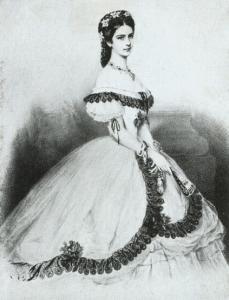
Thoughts of Elisabeth.
"A desire to always gives a greater desireAnd the heart remains unfulfilled.And happiness acquiredCeases to be happiness. "
"Do you know why so willingly travel incognito? Why do I like the land and the sea. The names of the men who have given their not worth it for the men themselves. But sea and land preserve their anonymity, and where they are freer and more hidden the nomenclature of men can not reach. "
"And my soul is full to bursting,The dreams dumb not enough anymore;Must be translated into the songs that moved,And are those dreams that I write in this book "
"I am a seagull that does not belong to any country,No beach is my home,I'm not fond of any place,Flight from wave to wave. "...
"Our intimate feelings, is more precious than all the titles and all the dignities, whose colorful rags dons and which is believed to hide nudity. Our nature is not changed in any way. What value in us, we bring into the lives of our previous spiritual existences. "
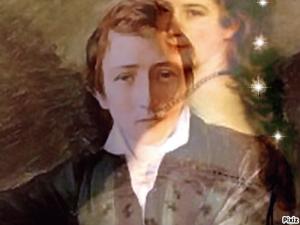
In original language ( German )
An meinen Meister
Es schluchzt meine Seele, sie jauchzt und sie weint,
Sie war heute Nacht mit der Deinen verreint;
Sie hielt Dich umschlungen so innig und fest,
Du hast sie an Deine mit Inbrunst gepresst.
Du hast sie befruchtet, Du hast sie beglückt,
Sie schauert und bebt noch, doch ist sie erquickt.
O könnten nach Monden aus ihr auch erblüh´n
so wonnige Lieder, wie Dir einst gedieh´n! -
Wie würde sie hegen, die Du ihr schenkst,
Die Kinder, die Du, Deine Seele getränkt.
(Winterlieder: Wien, Januar 1887, ein Gedicht für Heinrich Heine)
from site : http://www.sissi.de/historisch/poesie_tagebuch.php
Translation in English :
On my Master
There my soul weeps, she shouts and she cries,
She was tonight verreint with yours;
You just gave so intimately entwined, and finds
You've pressed on with your fervor.
You've fertilized You got happy,
She shudders and shakes yet, but it is refreshed.
O could after moons of her erblüh'n also
Sun blissful songs, as you once gedieh'n! -
As they would cherish that you give her,
The children who impregnated you, your soul.
(Winter Songs: Vienna, January 1887, a poem of Heinrich Heine)
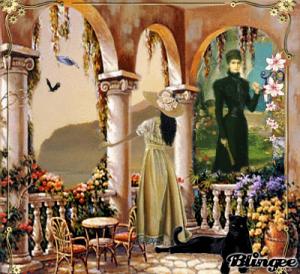
In original language ( German )
Verlassen
Wie war ich einst so jung und reich
An Lebenslust und Hoffen;
Ich wähnte nichts an Kraft mir gleich,
Die Welt stand mir noch offen.
ich hat geliebt, ich hab gelebt,
Ich hab' die Welt durchzogen;
Doch nie erreicht, was ich erstrebt.
Ich hab und ward betrogen".
(Gödöllö 1886)
from site: http://www.sissi.de/historisch/poesie_tagebuch.php
translate in English :
Abandoned
As I was once young and rich
To love of life and hope;
I believed nothing to force the same to me,
The world was open to me yet.
I loved, I have lived,
I have gone through the world;
But never achieved what I sought.
I cheated and was ".
(Godollo 1886)
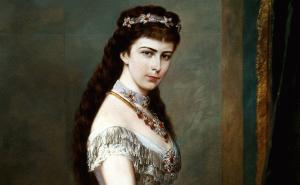
or sea, I sing a lot of songs
how much are your wavesI would write to you
I'd giftof all my feelings, all my thoughts,
and you tufferei my being lost
I would be the gem of your chest clear
or happiness of my eyes, or the joy of my life
the morning are my hopeand at dusk that appeal to you
I look at the last
Elisabeth
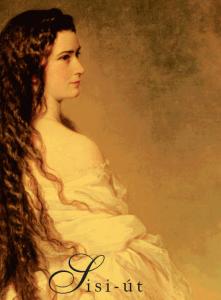
And now follow me come to the masquerade
we care if it's cold outside!
We bring the summer in our hearts
And the show sparkle with lights
Of all multicolor masks,
that noise, that noise, that noise, shouting
Whirling like mosquitoes
Happy, to the rhythm of a mad waltz music
But the two of us we have a better fate,
we sat in the carriage,
finding just the warmth of a nest,
and darkness enveloped us
Elisabeth
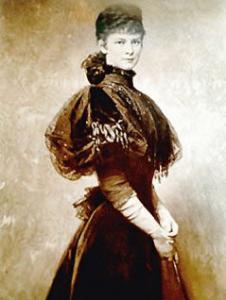
Ithaca
...
"Tell me, friend,
we are in Heaven,
we already fled from the earth? "
plan is now asking the seagull.
Whispers the other waves:
"We are in Ithaca;
- This place is sacred -
the soul of Odysseus is near. "
Elisabeth of Austria
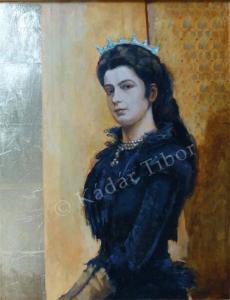
Once I had a thoroughbred stallion,
a beast beautiful and proud,
long gone unfortunately
and with him the great pride of the stable
Bucking willingly
non-experienced riders,
but not satisfied with scrollarseli off
then kicking and biting them as well.
I think about it from time to time
read in my book ...
But because I was reminded
and what does my stallion?
Elisabeth of Austria
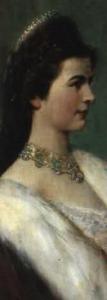
Ramsgate
Too late, too late we met ...
on the road of thorns that is life
too far there has gà brought from one another
innarestabile the wheel of time.
Too late the magnetic gaze of your eyes deep
to me set
even under those warm rays
is melted the ice of my heart
I take a deep melancholy
is like the sound of old times,
as a nostalgia unnamed
disturbing bitterness of despair
Anchio a time I was rich and secure
that my possessions could not drain
but for lightness I have dissipated
has long been an empty tomb
remained my heart
"O turn thine eyes elsewhere serious!
Let me go quiet on my way
I can not say that they have the happiness
then do not even want to see it before "
Elisabeth
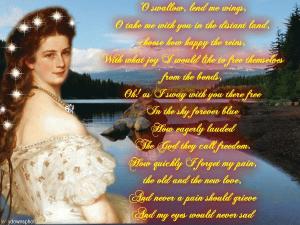
O swallow ,lend me wings,
O take me with you in the distant land
Choose how happy the reins.
With what joy I would like to free them
From the bonds
Oh! As I sway with you there free
In the sky forever blue
How eagerly lauded
The God they call freedom
How quickly I forget my pain
The old and the new love,
A never a pain should grieve
And my eyes would never sad
Elisabeth
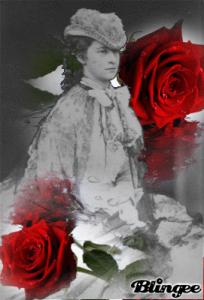
Leave of Zandvoort
One last, long look
to you, beloved sea!
Then farewell, however difficult it may be,
God grant that back!
I chose to take leave
the stillness of a moonlit night -
before me - or the vision splendid -
silver you shine forth.
When tomorrow over the dunes
You'll be touched by the rays of the sun
I with rapid wing beat
I'll be far away already.
Still hover over you
flocks of white gulls;
but a miss, you'll notice this?
Elisabeth of Austria

The thought of the Death purifies
As a gardener pulls weeds from his garden
But it is a gardener who wants to sit
Always alone
And is angry when the curios peep
In his garden.
This is why I keep the umbrella
In front of the face and the fan
Because the gardener
Can work undisturbed
Elisabeth
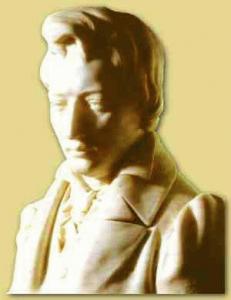
APHORISMS OF HEINRICH HEINE.
Where words end, music begins.
Praise be to the French who are taken to heart the two basic needs of human society: good food and civil equality, and have made great strides in the culinary and freedom.
Where they burn books they will also burn people. Be dried, peeled, even trampled by the feet of rough luck: This, my friend, is the fate of the earth beautiful and sweet.
God forgive me, it is his job.
The Germans are members of a nation in which no one is crazy enough to not find another crazier than he who understands it.
Wherever they burn books, they will also burn people.
Do not ask me what I have, but what they are.
For a woman, the ugliness is already half the way to virtue
It is sweet what you say, but the sweeter the kiss that I stole your mouth.
In the beautiful May, when exploding all the gems, then just popped in my heart is love.
The vane on the steeple, although so made of iron, would soon be broken by the wind storm if ... did not understand the noble art of turning to every wind
Heinrich Heine : a poet for Sisi
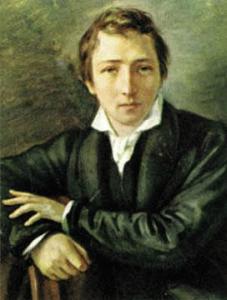
HEINRICH HEINE: a poet for Sisi.
Was the poet that Sisi is ispriò for the composition of his poems
Christian Johann Heinrich Heine (Düsseldorf, December 13, 1797 - Paris, 17 February 1856) was the greatest German poet of the period of transition between Romanticism and realism. ■ Born to a wealthy family of Jewish bankers and traders tried to concentrate but failed to a normal middle-class career that had taken very reluctantly. In Düsseldorf, his hometown, the events of the French awakened Heine in a strong antipathy to Prussia and a precocious Francophile trend. In 1817 he wrote his first love poems that were published in a German magazine and started in the city of Bonn, studied law, philosophy and literature following the lessons of August Wilhelm von Schlegel. In 1821 he moved to the University of Berlin and attended assiduously Georg Wilhelm Friedrich Hegel, Friedrich Schleiermacher and Adalbert von Chamisso, to accept the thought. The first opera and travel by Heine giovaneNel 1822 he published his first important poems that proved to be just of great originality for their style of folk ballad and its rejection of any ironic illusion. In these poems feels the influence of the writers he most loved: George Gordon Noel Byron and Joseph Fouque. In 1823 he published Intermezzo Opera (in German Lyrisches Intermezzo), poems of rare beauty stands out a strong vein of melancholy. In 1825 Heine converted to Protestantism and took the name of Heinrich instead of the original Harry. In the same year he graduated in law at the University of Göttingen. After the publication of his two books of short stories opera Travel Impressions (Reisebilder, 1826-1831), that the plot of a fictional diary is a wide range of fantastic themes and moral referring to the examples of Michael Sterne and Jean Paul, he started to become famous. In 1826 he made a short trip to England that awakened his interest in the current political problems and, later, the lyrics met earlier in one book called the Book of songs (Buch der Lieder) published in 1827. In 1828 he traveled to Italy and Florentine Nights (Florentinische Nächte), which will release in 1836, will gather the memories of this trip. The French period Meanwhile, the situation of German society was becoming more critical and Heine decided to move more freely as a journalist in France, where she was attending, as well as the German emigrants, as Lasalle, Richard Wagner, Alexander von Humboldt, many French intellectuals including Honoré de Balzac, Victor Hugo, Alfred de Musset and George Sand. In 1835 he published History of Religion and Philosophy in Germany (Geschichte der Religion und Philosophie in Deutschland) in which you feel the influence of his contact with sansimonisti, that influence is also felt in the Romantic School (Romantische Schule) of 1836. During those years of staying French, Heine worked, by correspondence, various German magazines and in the meantime he wrote reports in French of the German situation. In 1835, the date of the publication of his History of religion and philosophy, was banned by the censors circulation of his books in Germany. The four volumes of the Salon (1834-1840) are all imbued with political issues. In them we find the fragments of the novel's memoirs of Mr. von Schnabelewopski (Aus den Memorien des Herrn von Schnabelewopski) and The Rabbi of Bacharach (Der Rabbi von Bacharach), the persecution of the Jews in the Middle Ages and the Enlightenment also someone was inspired him. In 1840, the writer, in his book H.Heine of L. Börne give many explanations of aggressive ideas to meet the fellow who accused him. In the 1843 attack in his poem Atta Troll. Ein Sommernachtstraum his political opponents with hard and literary irony. In 1844, after a short stay in Hamburg, Germany will write satire in verse fairy tale winter (Deutschland, ein Wintermärchen), which will become one of the most important works of German literature of a political nature and in which you will hear clearly the influence of 'Parisian friendship with Karl Marx. In 1851 Heine publish a book of poetry Romancero where he describes, with deep seriousness ethical and religious causategli suffering from the disease that had struck him, muscular atrophy, and that forced him to bed for eight long years. The same sentiment pervade the later collections (1853 - 1854). In 1854 will see the light of the various writings (Vermischte Schriften) with lectures on Judaism and Christianity, liberalism and communism will be the end of his political and literary. Heine, die from progressive paralysis February 17, 1856, in Paris. The poetic Heine used the German language to sing melodious verses as few others have been able to do conquering, art, fame of the largest German artist of the generation following that of Wolfgang Goethe. He worked first on a mild and delicate psychological reality, based on the nostalgic memory of two unhappy love (for his cousins Amalie and Therese) and then stronger, when added to the other reasons for loving inspirational themes (nature, politics, life, contemporary society), was able to achieve a major impact in his poetry. He was able to play with skill stylistic giving his verses an objective tone even when expressing feelings and personal feelings. His book of songs, which is among the works of German literature translated the most famous, has a rare lightness of forms. The originality of the verses of Heine consists in striving for poetry and at the same time in the opposite way, that is what you want to deny any sentimentality, which allowed him to use the "material" romantic irony and realism. Fun Facts Heine Heine was named the crater on the surface of Mercury. Empress Elisabeth of Austria, wife of Franz Joseph, called Sissi, was a big fan, so to be considered one of the greatest expert of his opere.Scrisse also a songbook in its imitation collection of poems that for the sarcasm with which he described the court of Vienna, the author wanted to be published only after 1950.
Online encyclopedia Wikipedia




